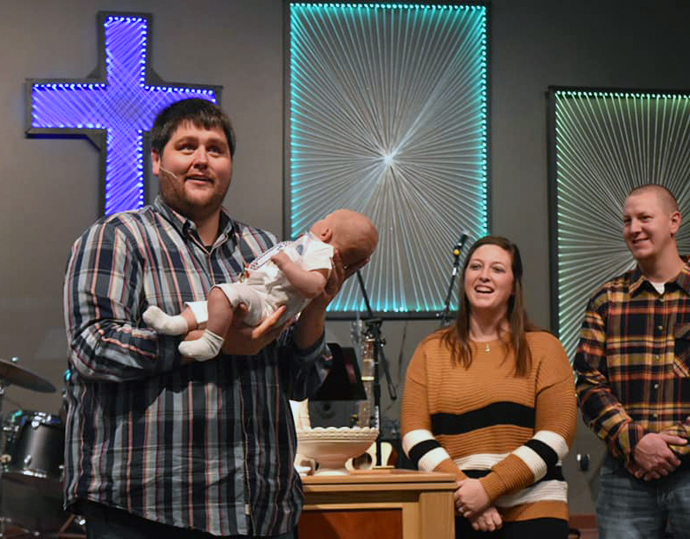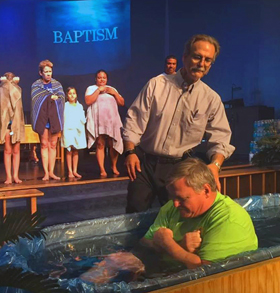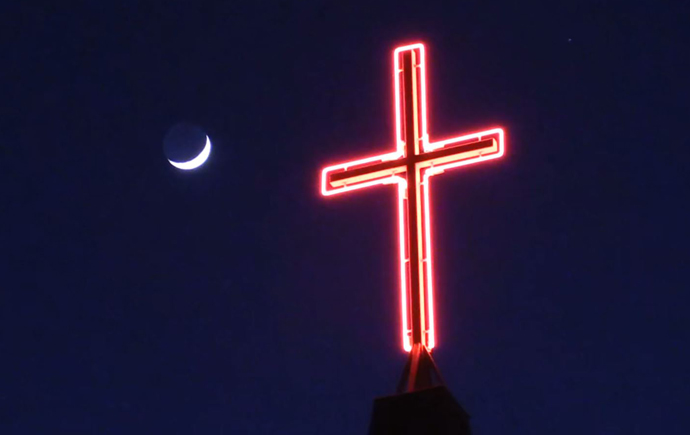
On the Aloma United Methodist Church website, there’s a link for church members to request souvenirs from its former sanctuary in Winter Park, Florida. Money from the sale of that church property will fund whatever ministry comes next.
The Aloma pastor said the church is looking at renting a local bar for worship services.
“We’ve closed the church,” the Rev. Chris Haden said. “The sale hasn’t closed but the public worship has stopped. It’s under contract and all the major hurdles have been cleared at this point.”
Aloma is a church restart, where an established church with poor or declining attendance makes extreme changes so it can better reach out and garner new, younger members.
The difficult process can bring controversy, but also pay off.
Bishop Bob Farr of the Missouri Conference has overseen about 30 church restarts there. All but two or three have been successful.
“It’s a very painful process. It feels like the death of a loved one in a lot of ways,” Farr said.
Some churches are content being a “hospice church,” said the Rev. Dottie Escobedo-Frank, who wrote the book “ReStart Your Church.” She consults with United Methodist and other Christian churches about restarts and is senior pastor at Catalina United Methodist Church in Tucson, Arizona.
“They want to stay as they are until they’re gone and then lock up the doors,” Escobedo-Frank said. “But if they want to plan for a future beyond them, then restart is a way they can do that.”
The Rev. Jason Martens is pastor of his second restart, Celebration United Methodist Church in Brandon, South Dakota. His last appointment was a restart at Unite Church in Salem, South Dakota. Attendance increased from 25 to 115 in Salem during his tenure. At Celebration, attendance declined over five years from more than 300 to about 125 by the time he was appointed to do the church restart.

“Yes, we came across some resistance,” Martens said about his experience at Unite Church. “We got rid of the organ and instead brought in a guitar and got rid of the hymnals and started (putting song lyrics) on the screens.”
The importance of frequent and frank communication can’t be overstated in a church restart, Martens said.
“That meant a lot of individual meetings with people within our church,” he said. “And being able to share the vision of, ‘I understand you don’t like that but I also know that you want to have your kids and your grandkids here, and so here’s the things we need to do to get your kids and grandkids here.’”
Not everything has to change. At Unite Church, a Sunday morning Bible study that attracted an older crowd continued. And Martens agreed that the United Methodist Women group would continue their annual fundraisers without interference.
Then he interfered, using social media to help promote the events.
“So all of a sudden they’re like ‘Aw, that’s pretty cool, we’re reaching a lot of people that we didn’t reach before,’” Martens said. “So they started to see how technology and some of the new tricks could also benefit them.”
Martens said the mission of the church remained the same. “We just really tried to put that focus on children and youth,” he said.
Think of church restarts in terms of Christianity’s central story — the death and resurrection of Jesus Christ, Escobedo-Frank said.
“In our churches we revere resurrection but we don’t want to die before resurrection happens,” she said. “Turn it off. Stop. Don’t do more of what you’re doing.”
Many churches with diminishing participation are allowed to gradually fade away in Missouri, Farr said. Only churches that fit certain criteria are considered for restarts. For instance, a large building where maintenance has been neglected is a poor choice for a restart.
A restart can happen if “it’s in a strategic location, there’s a vibrant mission field that they’re not reaching and the building is in decent shape,” he said. It helps if the church has some money in the bank.
An important step in a restart is shutting down the existing church for an extended period, Farr said.
“We call it going dark,” he said. “We take the sign down. We shut her down. We lock her up and she’s dark for a year.”
Escobedo-Frank said such a break in activity can allow people to perceive that the church isn’t about “me, mine and ours.”
“It’s about what God is up to in our town or our community … and how we can go along with whatever God is up to, and recognizing that some things die.”

A plan for a church “going dark” in June as part of a restart plan resulted in some members complaining of age discrimination and saying they were asked to leave The Grove United Methodist Church in Cottage Grove, Minnesota.
A pastoral letter shared on the Dakotas-Minnesota Conference website said the worshippers at the Cottage Grove location (the church has another campus in Woodbury) are “beloved members of our church family.” The letter, signed by the pastor, the Rev. Dan Wetterstrom, and other church leaders, said Cottage Grove members could attend services in Woodbury or “continue as a group” at a different time or location after the church closed.
Cottage Grove, the smaller of The Grove’s two church campuses, averaged 29 weekly worshippers last year. The plan is to reopen the church after several months with a new pastor and new worship styles that could make the church more appealing to younger families and children.
The conference also responded with a letter reaffirming the commitment to existing churches and members, but calling attention to the church’s mission.
“At the same time, we know that the church exists for those who do not yet know God. We have been given a mission: to make disciples, new disciples, of Jesus Christ for the transformation of the world! That is why we start new churches,” the conference letter said.
Haden, of Aloma United Methodist Church in Florida, negotiated with the manager of what he calls a “nerd bar” called the Geek Easy. The bar hosts standup comedy and burlesque shows along with karaoke and trivia nights.
“They are closed on Sunday nights, and I was just speaking with the owner or manager or whatever — a guy named Alex — about renting their space on Sundays,” Haden said. “As we were talking about it, he said, ‘Why don’t we just open the bar, and I’ll have staff there to tend bar and if we can generate enough of a crowd to make the night work, then we’ll reduce how much it costs to rent the space.’”
The first church meeting at Geek Easy is set for March 15.
While United Methodists don’t prohibit alcohol, the United Methodist Social Principles affirm the denomination’s long-standing conviction that abstinence to alcohol and drugs witnesses to “God’s liberating and redeeming love.”
The Geek Easy does sell beer and wine, but Haden noted other United Methodist ministries meet in breweries and bars. “We’re kind of taking the slant like ‘Ask for forgiveness, not permission,’” he said. For now, Haden said he would refer families with children to other United Methodist churches in the area.
That experience, obviously, will be a lot different for Aloma members. Haden notes that church members voted 80% to 20% to try something new. He has tried to steer members uncomfortable with meeting in a bar to nearby United Methodist churches that have more traditional services.
“There is (still) some antagonism around and within the decision,” Haden said. “The majority of that congregation saw the writing on the wall, heard the case, didn’t like the decision they had to make, but understood why it had to be made.”
Patterson is a UM News reporter in Nashville, Tennessee. Contact him at 615-742-5470 or newsdesk@umcom.org. To read more United Methodist news, subscribe to the free Daily or Weekly Digests.
Like what you're reading? Support the ministry of UM News! Your support ensures the latest denominational news, dynamic stories and informative articles will continue to connect our global community. Make a tax-deductible donation at ResourceUMC.org/GiveUMCom.
